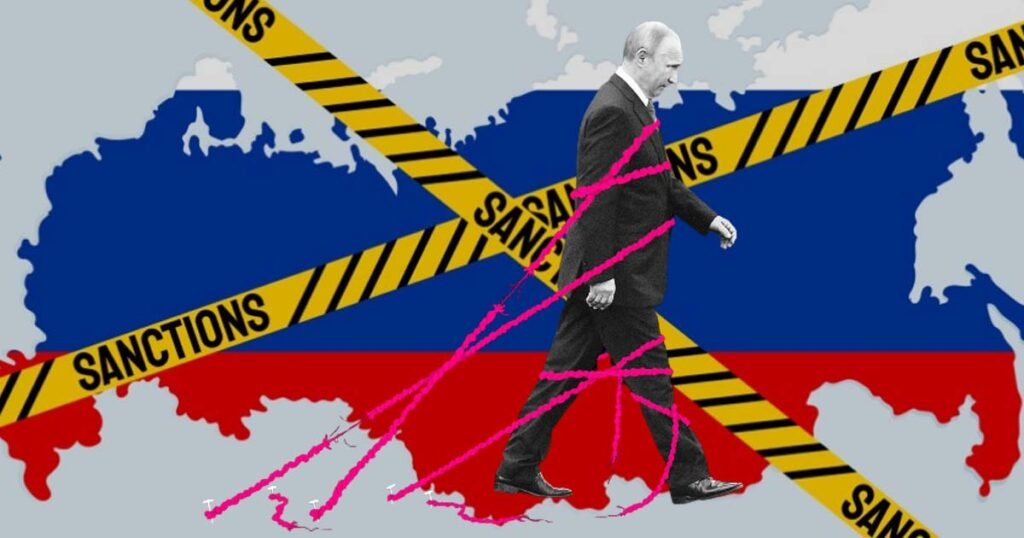The Kremlin confidently asserts that Russia’s economy is well-prepared to weather the storm of additional sanctions, remaining unshaken by the prospect of further punitive measures. This resolute stance was put on display in the wake of a momentous event, as on February 25, 2022, Russia initiated a full-scale invasion of Ukraine. Later, this prompted the European Union to introduce an expansive range of sanctions to Russia. These measures were explicitly designed to communicate to Moscow the unequivocal severity of the consequences awaiting their actions.
You Can Also Read: HOW RECKLESS PURSUIT OF SANCTIONS IS BACKFIRING ON THE US NATIONAL INTEREST?
To date, the European Union has enacted a total of 11 comprehensive sanctions packages, and just last week, committed to eliminating any existing loopholes within these measures. EU officials have made it clear that these sanctions could endure for an extended period, potentially spanning several years.
‘Decades of sanctions haven’t shaken us,’ – Russian spokesperson
In response, Kremlin spokesperson Dmitry Peskov confidently remarked, “Russia has been living under a sanctions regime for quite an extensive duration, spanning decades, and we have adeptly adjusted to this reality. Thus, the prospect of sanctions persisting for five to ten years does not instill fear within us.”
Anticipation lingers in the air as Peskov acknowledged, “As for new packages, yes, they are being prepared, this is quite well known and predictable … We can only wait to see what else our opponents will come up with.”
Remarkably, Russia contends that these sanctions have had an unexpected impact, bolstering its domestic economy and bolstering industrial production. Nonetheless, certain observers maintain that these measures have been outwitted and have fallen short in dissuading Russia from its pursuit of hostilities in Ukraine.

Moscow remains unyielding in its stance, asserting that no measure will dissuade it from pursuing what it perceives as its vital national interests in Ukraine. In contrast, Moscow accuses Western powers of exploiting Ukraine to weaken and destabilize Russia’s own security. Western nations and Kyiv vehemently reject this notion, branding Moscow’s actions as an unprovoked war of aggression and a territorial land grab in Ukraine.
In 2022, a report by Norway-based risk consultancy Corisk revealed that the evasion of export sanctions against Russia amounted to a staggering 8 billion euros ($8.5 billion). The report meticulously analyzed customs data from a dozen EU nations, along with Norway, the United Kingdom, the United States, and Japan.
Survey reveals economic struggles
Findings from a survey encompassing nearly 5,000 respondents in October have cast a spotlight on Russia’s prevailing economic challenges, a matter of increasing concern for authorities as they approach the forthcoming presidential elections in March. These elections are poised to see President Vladimir Putin potentially extending his more than two-decade reign.
Notably, this year’s unprecedentedly low unemployment rate serves as a telltale sign of Russia grappling with a labor shortage, while the enfeebled state of the rouble continues to stoke inflationary pressures. In response, interest rates are anticipated to climb beyond 13% to combat the looming specter of around 7% inflation, surpassing the 4% target set by the Bank of Russia.
Within the survey, a mere 20% of Russians affirmed that their salaries suffice to cover basic expenses, with 36% responding in the affirmative but with palpable difficulty. Alarmingly, a resounding 44% now view their income as insufficient. This statistic represents a substantial increase from 25% in 2021 and 39% in 2022. It’s worth noting that prior to Russia’s military involvement in Ukraine in 2021, only 36% regarded their earnings as inadequate.

Of those deeming their income insufficient, over half reported experiencing a monthly shortfall of at least 20,000 roubles (201 EUR). Contrasting with this, Rosstat statistics reveal an average nominal monthly salary of 71,419 roubles (719 EUR) for July. While real wages in Russia are surging, driven by defense companies racing to fulfil government contracts, many other sectors struggle to retain their workforce due to their inability to match the competitive salaries.
Looking forward, forecasts from both the International Monetary Fund (IMF) and domestic sources hint at a prospective economic recovery in 2023 following a 2.1% decline in GDP in 2022. Nevertheless, Russia’s long-term outlook appears fraught with challenges.
In a scenario where the rouble strengthens more than anticipated and optimistic economic assumptions remain unfulfilled, analysts caution that a revenue deficit could loom in 2024, potentially necessitating an increase in business taxes.
As the standoff persists, Western nations and Kyiv remain steadfast in their assertion that Moscow is waging an unwarranted war of aggression in Ukraine. In contrast, Moscow vehemently accuses Western powers of exploiting Ukraine as a means to undermine and weaken Russia’s own security. This ongoing geopolitical clash has ushered in a climactic confrontation between powers, where economic resilience and strategic resolve collide in a tense and high-stakes scenario.


